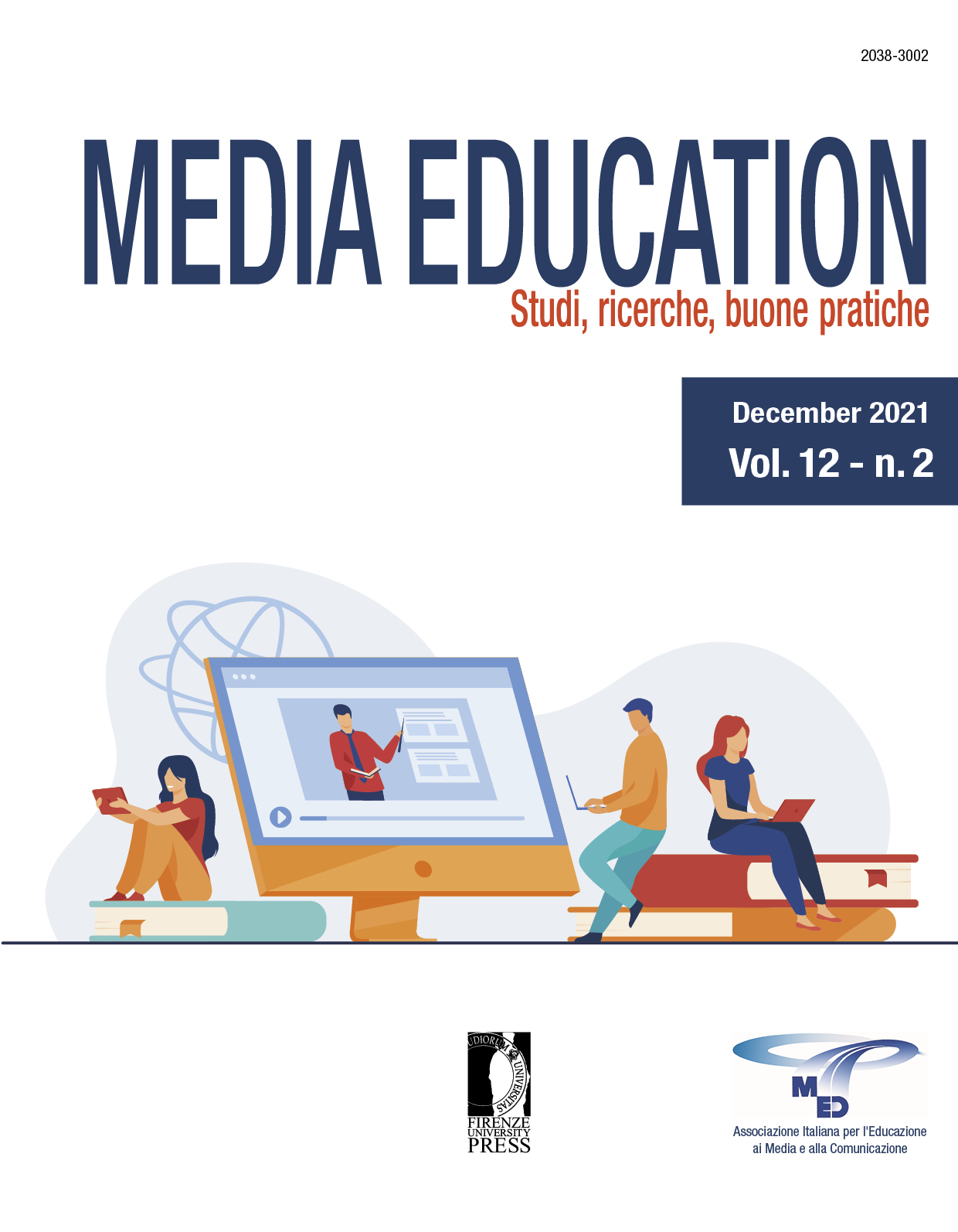Published 2021-11-29
Keywords
- old and new media,
- addiction,
- youth
Abstract
The pervasiveness of new media has raised some questions as to what would happen if we were to deprive ourselves of different media forms for a shorter or longer time. The debate on this issue has become intense in recent years, especially in relation to the hypothesis that the relationship with the web and internet can configure a greater and more insidious dependence on media. To verify how, and if, this happens, I asked 121 university students to refrain from the consumption of media on smartphones, tablets, radios and televisions for a period ranging from three days to a week. The results, collected in diaries compiled during the test, testified to different levels of attachment to media, the interruption of which produced notable consequences in the daily organisation of time and social relations.
References
Berelson B., 1949. What Missing the Newspaper Means. In Laz-arsfeld P. and Stanton F. (Eds), Communications Research, 1948-1949, New York, Harper, pp. 111-129.
Blumler J., Katz E. (Eds.) (1974). The Uses of Mass Communications. Current Perspectives on Gratifications Research. Sage. Beverly Hills.
Cheever, N. A., Rosen, L. D., Carrier, L. M., & Chavez, A. (2014). Out of sight is not out of mind: The impact of restricting wireless mobile device use on anxiety levels among low, moderate and high users. Computers in Human Behavior. 37, 290-297.
Clayton, R. B., Leshner, G., & Almond, A. (2015). The extended iSelf: The impact of iPhone separation on cognition, emotion, and physiology. Journal of Computer-Mediated Communication, 20(2), 119-135.
Cohen, A. A. (1981). People without media: Attitudes and behavior during a general media strike. Journal of Broadcasting & Electronic Media, 25(2), 171-180.
Dardenne, R. (1994). Student Musings on Life without Mass Media: Antidote for Silence, Boredom, and Thinking. The Journalism Educator, 49(3), 72-79.
De Bock, H. (1980). Gratification frustration during a newspaper strike and a TV blackout. Journalism Quarterly, 57(1), 61-78.
Elliott, W. R., & Rosenberg, W. L. (1987). The 1985 Philadelphia newspaper strike: A uses and gratifications study. Journalism Quar-terly, 64, 679-687.
Gui, M. (2014). A dieta di media. Comunicazione e qualità della vita, il Mulino, Bologna.
Hall, J. A., Xing, C., Ross, E. M., & Johnson, R. M. (2021). Experi-mentally manipulating social media abstinence: results of a four-week diary study. Media Psychology, 24(2), 259-275.
Hoffner, C. A., Lee, S., & Park, S. J. (2016). “I miss my mobile phone!”: Self-expansion via mobile phone and responses to phone loss. New Media & Society, 18(11), 2452-2468.
Knowles, A. D., Fenner, P., McNeil, M., Merrigan, C., & Power, V. (1989). TV or not TV: the impact of two weeks without television. Media Information Australia, 52(1), 26-29.
Lather, J., & Moyer-Guse, E. (2011). How do we react when our fa-vorite characters are taken away? An examination of a temporary parasocial breakup. Mass Communication and Society, 14(2), 196-215.
Lee, U., Yang, S., Ko, M., & Lee, J. (2014). Supporting temporary non-use of smartphones. In ACM SIGCHI Conference on Human Factors in Computing Systems (CHI14). Workshop: Refusing, Lim-itng, Departing: Why We Should Study Technology Non-Use Workshop.
Lepp, A., Barkley, J. E., & Karpinski, A. C. (2014). The relationship between cell phone use, academic performance, anxiety, and satisfaction with life in college students. Computers in Human Behavior, 31, 343-350.
Mascheroni, G., Vincent, J. (2016). Perpetual contact as a communi-cative affordance: Opportunities, constraints, and emotions. Mo-bile Media and Communication. 4, 3, 310-326.
Moeller, S., Powers, E., & Roberts, J. (2012). «The world unplugged» and «24 hours without media»: Media literacy to develop self-awareness regarding media. Comunicar. Media Education Research Journal, 20(2).
Paasonen, S. (2021). Dependent, Distracted, Bored: Affective Formations in Networked Media. MIT Press. Boston.
Rubin, A. M., & Windahl, S. (1986). The uses and dependency model of mass communication. Critical Studies in Media Communication, 3(2), 184-199.
Scarcelli, C. M. (2019). Lo smartphone oltre la dipendenza, in Dru-sian, M., Magaudda, P., & Scarcelli, M. (Eds). Vite interconnesse. Pratiche digitali attraverso app, smartphone e piattaforme online. Meltemi, Milano.
Silva, S. (2012) On emotion and memories: the consumption of mo-bile phones as “affective technology.” International Review of Social Research, 2, 157–172.
Stieger, S., & Lewetz, D. (2018). A week without using social media: Results from an ecological momentary intervention study using smartphones. Cyberpsychology, Behavior, and Social Networking, 21(10), 618-624.
Tan, A. S. (1977). Why TV is missed: A functional analysis. Journal of Broadcasting & Electronic Media, 21(3), 371-380.
Tromholt, M. (2016). The Facebook experiment: Quitting Facebook leads to higher levels of well-being. Cyberpsychology, behavior, and so-cial networking, 19(11), 661-666.
Vincent, J. (2006). Emotional attachment and mobile phones. Knowledge, Technology & Policy, 19, 39–44.
Windahl, S., Höjerback, I., & Hedinsson, E. (1986). Adolescents without television: A study in media deprivation. Journal of Broad-casting & Electronic Media, 30(1), 47-63

